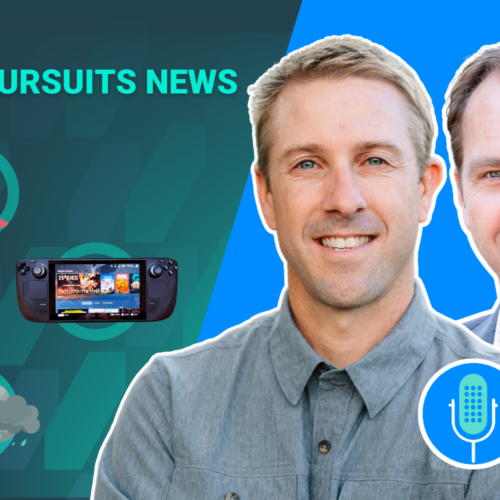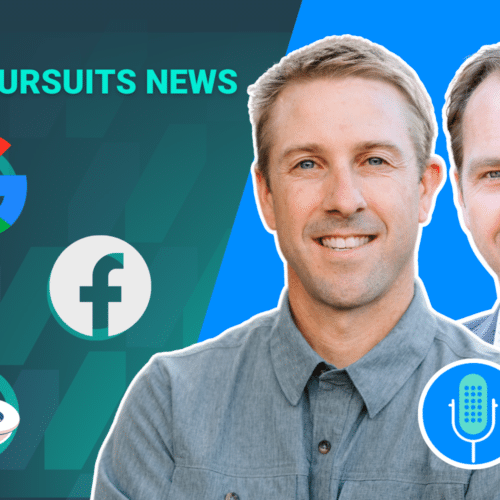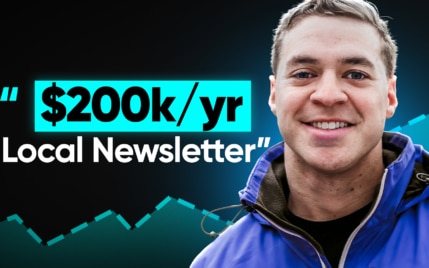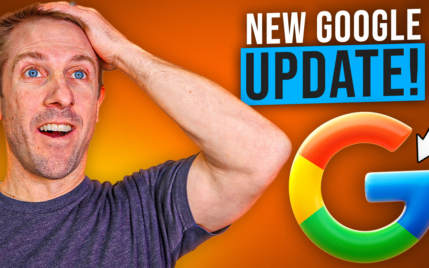How I Grew My AI Site to $21k+ Per Month In Under 12 Months

When you buy something through one of the links on our site, we may earn an affiliate commission.
Ready for a masterclass on how to survive and thrive with an AI site in today's Google?
Casey Botticello joins us on the podcast to share how he took an AI site from zero to $21k+ monthly in under a year.
To explain his approach, he dives into all sorts of interesting topics:
- AI content production advice,
- Careful niche selection when using AI,
- Tips for avoiding the Google sandbox,
- The importance of adding value and new information in the chosen niche,
- His process of topical mapping,
- Focusing on broad research,
- Coupled with in-depth analysis to identify important topics,
- And much more!
Casey shares that AI played a role in content ideation and the generation of article drafts, but how extensive editing and fact-checking were essential before publishing.
He highlights the importance of maintaining high-quality content and strategic planning to avoid appearing AI-generated.
As well as the increasing dangers of obvious optimization and over-reliance on popular keyword research tools.
There's also a discussion on multimedia with some advice that seems to work even in an age where Reddit and other forums are seeing an advantage on Google.
Overall, this is an excellent and actionable look into how to successfully harness AI for blogging, and it's a must-listen for the Niche Pursuits audience.
Watch The Interview
Topics Casey Botticello Covers
- The types of niches that work best with AI
- How he built his site with GPT 3.5
- Avoiding overly-SEO targeted topics
- Deep diving into a niche
- Personalizing AI content
- Topical mapping tips
- The importance of original visuals
- Important tips to speed up indexing
- Topical authority
- Avoiding over-optimization
- Staying under the radar and scaling fast
- Monetization
- Setting goals
- And more...
Links & Resources
- Blogging Guide
- Blogging Guide Newsletter | Casey Botticello | Substack
- Casey Botticello - YouTube
- Koala - The Best AI Writer and Chatbot
- Get SEO Consulting from the Niche Pursuits Podcast Host, Jared Bauman.
Transcription
Jared: All right, welcome back to the Niche Pursuits podcast. Today, we are, my name is Jared Bauman. Today, we're joined by Casey Botticello. Casey, welcome on board.
Casey: Well, thanks so much for having me,
Jared: Jared. It's great to have you. We are talking all about AI today, which is always a fun subject, especially as we venture into the new year here.
And I mean, I, you have such a cool case study that you've, you've published. And really, I mean, it's my first time getting to talk to you, but you're not exactly. A newbie here to the niche pursuits audience. You did a really good, uh, YouTube live with Spencer and I believe, you know, you've been a bit of a listener as well.
Um, uh, I'll stop telling everyone about you. You tell us about yourself. Give us a little background on who you are.
Casey: Well, you're right. I, I am a big fan of the Niche Pursuits podcast, so I'm an avid listener. But yeah, I think I'm, I'm active on a lot of, uh, the private forums and different discussion groups.
So I'm sure people have run into me before, but for those who haven't, um, I'm Casey Botticello and, uh, for the past, I guess now about 10 years, I've been doing Digital marketing in some capacity. Really? I haven't, I've done blogging for probably. Full time for the past five years or so basically It started off as a side hustle as it often does.
I Actually kind of got into it a little differently than most. I was a writer I I did sort of high end ghostwriting for clients at a lobbying PR firm Uh, I'm based in Washington DC, so that's sort of, that's why, you know, why I live here. So that's sort of like how I came at it and I was very familiar with SEO, although we kind of referred to it as online reputation management, that was sort of the PR buzzword.
That's
Jared: how you're able to charge more for SEO, is what you call
Casey: it. I was going to say, no, you're exactly right. Like I, people think SEOs are expensive, but you, you attach that three letter acronym to anything and you, you wouldn't believe it. It's like instant five figures for the fee. It is like, yeah. And which makes sense.
It's. High profile people, their reputation. So I, I did have a fair amount of SEO experience. Um, and I was, uh, enjoyed writing. So of course, creating my own blog and sort of a portfolio of work with my name attached to it. Or at least just something I could show to people I thought was useful. Um, since most of my other writing was, like I said, I was sort of the ghost writer.
Um, so given that today's topics all about AI, I, I have a deep respect for writers. Um, and I definitely think that AI is a tool meant to assist writers. This site that we're talking about today, uh, it. It was generated pretty much using AI content exclusively on the first draft, but the content, to be clear, was edited by me.
So I, I, I want to add that disclaimer that this was not like a one click and then publish sort of AI get rich quick scheme or something like that. I, I spent a considerable amount of time, um, editing this, but I'll let you get into
Jared: that. Well, and I'm glad you, cause we're going to get into it. I'm going to ask you a couple of the tough questions on that.
I mean, we are going to be talking about a tool you used, which would be considered like a one click AI publishing tool. And so the clarity is good because I think a lot of people will come into hearing this was written by this tool or a tool IE. It means, oh, okay. And, and all the stereotypes will prevail.
Right? So coming at it from the front end of saying, yeah, we're going to be talking about a tool. An AI writing tool, notice how I'm trying to build intrigue here, trying to keep them engaged and interested. We're going to be talking about this tool, but I'm glad you had a clarity that we're going to really get into how you use the tool beyond just what it spit
Casey: out.
Definitely. And like I said, it's, it, it, it makes it. Big difference. I know some people say they edit and fact check, but as we'll get into, there's a fair amount of time spent doing this. So really this is just sort of blogging with sort of bionic superpowers. That's how I think of it. It extends my ability to scale content production.
Jared: Modern blogging. Um, so let's, um, let's give people a little tease of what we're talking about here. Now, you published a case study on the Koala Writer blog. So there it is. And then from there, we're going to be talking about that site and that project. Maybe from a high level, just spend maybe one or two minutes telling us what the project is and if you can, any anything you're comfortable sharing with where it's at right now.
And again, really just to give people context into the scope of what we're talking about. So then we can start unpacking how you did it.
Casey: Sure. So the site is. Uh, almost a year old now, so it's a, still a relatively new site. Um, it generates, so it's monetized through Mediavine. So it's almost purely display ads as far as the, uh, income.
It generated 21, 700 some last month. So that was by far its highest month ever. And it's been sort of climbing at a rapid pace ever since it was, I guess it was accepted in the Mediavine in mid May. So it's been kind of, you know, the growth has been up and to the right, um, for sure. It's obviously been kind of a crazy time with all these algorithm updates.
So I think that really, The case study, uh, does show that if you sort of focus on topical mapping and you focus on clustering the content in a very non SEO oriented way, but then go back and apply some basic SEO framework to the content, you can, you know, Basically scale a site really fast. Now I think these results aren't typical.
I think, you know, it takes, uh, honestly, there's a degree of luck in there, but I've launched several of these sites and while we're only focused on this one, all of the sites have more or less survived. Pretty much all the updates since the helpful content update. So, and I'm talking 25 sites, so there, there might be something to that.
Uh, I don't know if that's enough data to draw that conclusion. But that's where the site is today. It's about this month. It'll in December, it'll probably do about 25 K or so if it continues. And that's about 550, 000 sessions.
Jared: It's so there's so many interesting storylines there, right? Like just. Having a site that survived the HCU, I mean, I'm not going to say it's rare, but it's, it's, it's certainly an accomplishment, right?
At this point, the helpful content update has come through and really hit a lot of the sites that listeners have. And maybe it's mild, maybe it's 5, 10%, many, obviously it was crippling. You don't just have a site that survived the HCU, it's continued to thrive post. HCU and October core update, November core update, but not only does it thrive through all that, it is basically built entirely on the backbone of AI.
So, um, anyways, this is going to be such a fun, I'm worried we're not going to get it all in, in the hour or so that we have. So, um, Hey, let's start, let's start at the beginning. And again, like, let's try to keep this as tactically focused as possible, because every, I'm going to go ahead and just assume that everyone listening is either heavily utilizing AI.
Um, using AI in part of their workflow, but not all of it, or knows they need to going into the new year and the year's coming. So they're gonna be very interested in a lot of the tactics you use. Where did the concept for this come from? And, you know, what, what, what sort of AI were you, you know, using prior to this website that got you interested in using this?
Casey: So basically, as soon as I've been playing around with sort of the pre chat GPT tools like Jasper and stuff like that, um, in 2022, but I wasn't really happy with any of them. I certainly wasn't going to build an entire site based on them, but I was intrigued by sort of like the precursors and then like most people when chat GPT came out in late November.
Uh, I was, I immediately, especially as a writer, I was kind of confronted with the reality that, you know, AI can produce, and this is very niche specific, and a big part of this is niche selection, which I can go into, but, you know, for the right niche, AI can definitely produce at least a great first draft Or sort of subtopics or different sort of topical mapping structures that can really save you an enormous amount of time.
So, I immediately dove in. I began playing around with it. Uh, I, you know, was basically looking for I knew there'd be a good opening basically to, to try it. Now at first Google didn't clarify their stance. So if you remember back in like January, it was sort of like almost considered black hat for a while, you know, before we really knew their stance.
And then come, so I, I started the case study in January and at first I just kind of shared it on a few of the forums I'm on, but it wasn't. I didn't even post it on my own site blogging guide. Like I didn't start documenting it until February when, uh, Google made that update where they basically said, you know, AI, any content is okay, as long as it's high quality.
So at that point, you know, it was sort of off to the races. Um, I still didn't want to, I didn't want the site to have any of the characteristics of an AI site. So I made a real effort to sort of hold back on not going wild with publishing. Um, I have all the likes, the specifics on my website and on that qual article of the number of posts, but I started off with first month with.
27 posts or 29, I believe. And basically these posts, again, I also wasn't sure the effective AI's basically I wrote these posts and, or I have a team of freelance writers who I outsourced this to. So the typical process you would go through for a niche site, but I made sure these first posts were really good and not just really good, but they were very much the sort of.
Helped Google Understand what the site was about and that was very deliberate So the site the site was a fresh. Well, it was a domain I had purchased Actually like a year prior to this and it was just a brand of a good brandable name So that the domain itself had no backlinks there never been a site as far as I could tell on the The built on the domain, you know, it had been listed for sale basically.
So it's not
Jared: like a classic age domain. It was just a, you kind of had city. Had you published even like a landing page to it? Or was it
Casey: just, that's a good point. And I I'm glad you asked that. So basically I do what I call like a shell site where I knew that basically I was going to be doing this AI experiment starting.
Maybe around November. So I, I, as soon as that was clear, I put up the legal pages, the homepage. Uh, supporting sort of pillar pages and if, and maybe like five blog posts that were generic enough that I wouldn't have to scrap the whole site later, but were specific enough that Google could start, you know, understanding potentially what the site was about.
And I made very, a very deliberate effort to get that site indexed. And although there weren't that many posts or pages. It was indexed, and I noticed that the, the crawling of the site seemed pretty good. I made sure the, the host, I put it on my top notch hosting. I had a fast theme. I stripped all plugins.
You know, I did it kind of textbook. And uh, that, that was how the site was left until I started publishing in January. I know for a fact that helped that helped definitely just it was indexed when I started publishing in January The the post didn't index right away, but we're talking only like a month or less delay so there was no like traditional sandbox period let's say and so yeah, like If you're going to do this in such a short period of time, that, that almost has to happen, you know, you have to really hit the ground running, um, otherwise you just mathematically can't get to like, I mean, I was, I thought the goal was to get to Mediavine in a year.
That was, I thought, ambitious, uh, like starting from zero. So the fact that I did it in half that time and really. After I talked to Mediavine, they were like, cause I kind of was like updating them on my progress because I have other sites with them and they always throw around that often cited statistic that second sites don't do as well as first sites, Casey.
And I was like, no, this one's going to be like. A big one. And they were like, okay, and I literally updated them every month, of course, asking to make an exception and allow me in. And they said, no, in fact, I learned that your site actually, for most networks need to be at least four months old, including Mediavine, uh, to, to be accepted.
So the fact that it got in, In May, the fifth, five months in about as soon as possible. It was like six days after the
Jared: cutoff or whatever. Now you said that you, I mean, I don't want to put words in your mouth, but it sounds like you hand wrote or had a handwriting process for the first, I think he said like 29 articles.
Then you moved into an AI assisted model after that. So the first 29 was just full bore on a traditional setup and publishing style that you would have used pre. Well, pre chat GPT,
Casey: basically. Yeah, I think ten were written by me, um, and they were like long form, sort of. Pillar posts, if you will. And then maybe 19 were done by the kind of experienced team of freelancers that I was currently working with.
Jared: Now, I don't want to move on to fat. I have more questions, but before we move on from it, you did mention, I wrote it down that there's a bit of a different process, I think you said to picking a niche when you are looking at using AI and, uh, maybe expand on that a bit. Like how did you select this niche in particular?
Or what about this niche do you think has caused it to be successful with an AI focused model?
Casey: That's a good question. Um, and I'm still experimenting with that with the other sites. But the short answer of what I've kind of learned is that for a site to work, you know, you need to think about what the value add or like the information gain sort of is.
So if you can add perspective, if you can add original photos, if you can, you know, basically if there's a human element. That you can incorporate that and the AI writing, at least can take care of sort of what amounts to, I don't want to say fluff, but what amounts to sort of the body supporting content, almost like if you were doing an e commerce store, I think of it more like that, where you'd have product descriptions that are, you know, AI can write quickly and punchy copy that saves me a ton of time and money.
So the idea was to find something that. It was fact based, um, that was fairly evergreen. And as I later got into it, the other thing that became obvious, cause at first I wasn't, Koala didn't exist. Right. So it, it wasn't even around at the beginning. I was literally using chat, GBT, and then like kind of manually assembling articles.
So it became clear later on though, that the key was finding topics. That were cost effective and had the highest ROI relative to the cost of AI content production. And so it costs different amounts depending on which GPT model you use. So my goal was actually, everyone was excited for GPT 4 and it's better.
It's great. And now I use 4. 5, the turbo, of course it's even better, but the, this site was built almost entirely on 3. 5. And my best sites still are, and that's like, kind of, that's a real hidden gem there that I think people, you know, should take note of because the cost is about five times less. So if you're out there competing with people, you know, there's always the question of, well, how do you build a mode if you're, everyone else can pump out this content.
In addition to adding your own unique images, insights, videos, all that stuff, another thing too is the, just the cost. You know, you can deter people when you can put up a thousand posts, you know, for, you know, 1 and they can do it for five, you know? So it's, so you have to think about things that topically make sense, ideally things that you have some real expertise in.
And going back to your, I think your previous question, I picked this niche based on a, uh, topic. It was a tech topic and. Um, I basically had taken a few courses on this in college. So it wasn't like my major or anything, but it was like a sort of like a passion or like interest of mine and the topic and part of why this grew so fast was the topic was well established, but like a lot of things with tech, you know, it's undergoing quick, rapid change.
So the specific kind of angle I was covering. You know, was, was rapidly evolving. There were no sites dedicated purely to this sub niche. And this was like, like I said, the laser focus. I wrote out the map of the first 750 articles. Which I just finished actually, and I wrote that out about a year ago in, in December, I think, and I Stuck to that and I had to try really hard, Jared, not to Deviate when I would find ones where the, it was clearly keyword search volume But the whole idea behind this was to avoid anything that would appear SEO overly SEO driven and Although I didn't know it at the time that would also come back and save me probably during all these helpful content updates because This was like the least SEO oriented site I've ever done.
And I've had very successful ones that are SEO driven and long tail keywords and all that. This was the exact opposite. I mapped every article before I had even.
Jared: Well, that was going to be my second question because you talked earlier about how AI contributed to both your niche selection, but also your, also your topical mapping.
I think maybe a traditional SEO approach outside of this AI model that we're about to talk with that you went into would be go to a keyword research tool and start with a seed keyword. You know, maybe I'm not, I don't even know what your site is about for the record. But let's say you mentioned text, let's say iPhone, right?
So you go into a keyword research tool and you would type iPhone in and you start parsing through and building out the main topics, the subtopics, the long tail topics, the questions, the answers, the comparisons, the reviews, the buyer guides, the how to's, all this, and maybe create a topical map that way.
If that was something you even wanted to do before you started a website, right? Like, what does it look like to build a topical map in an AI world that isn't SEO driven? I think,
Casey: well, a lot of people, unfortunately, are still using it the same way. But if the way I did it, and I think the way I recommend to people, um, and I have a, a post I recently added.
Just to give a little more insight if people want to look at on blogging guide just on if you just google topical mapping I'm sure it'll come up but Basically, the idea is that instead of starting with the keyword research tools You start in a very broad research phase where you don't use a single keyword research tool You totally ignore volume.
This does require you knowing your niche because you have to Pick something that's laser focused while also knowing intuitively that there's enough traffic for whatever You're trying to accomplish in my case. I was saying okay if I can win, you know half of these 750 articles it are there 50, 000 sessions because that that was just the media vine cutoff so that was sort of And then from there, I basically on a whiteboard at first, but later just in like a notion would basically write down article ideas after thoroughly investigating the subject.
And I mean, everything from manually Google searching. every possible sort of query to pot scraping podcast transcripts for things that maybe weren't indexed but were valuable info, to watching YouTube videos. I joined a private forum related to this niche. I actually went to an event Um, related to it.
So like I actually talked to people and that, uh, I joined even a few webinars. So the goal was to get, you know, a real tight, you know, sort of feel for like what people actually cared about and what they were talking about and kind of where things were headed. Cause I knew that I didn't have a chance to outrank the large tech incumbents that were had broadly covered.
Some of these like shoulder niches, but I knew if I stayed in this very narrow lane that, uh, and people are not covering these topics and When I would later spot check them in hrefs or whatever They would be a lot of them would be zero You know search keywords So it was a classic case of like, you know If you were just going through looking for search volume, this would never have registered.
But, you know, if you knew anything about the niche, and even with just a little bit of common sense, You could be like, okay, the tools are not picking this up, which is fantastic because less people are going to be going after this, but also less people are going to understand the strategy of the site. Um, so I basically didn't put ads on the site until I got to Mediavine.
So I think from both the user experience perspective, but also just strategically. I knew this site, if it was going to grow fast, it needed to stay under the radar on Ahrefs or not appear on one of those Twitter lists. Where someone's showing like low, you know, low DR, high trap, you know, so the goal was like, yeah, basically to stay off the radar and do this as fast as possible without it appearing AI generated.
So I tended to stick to like 20 to 80 posts a month. And these were posts that, like I said, I heavily edited manually. So a
Jared: lot of that. Because you came up with 750 articles to write, and a lot of what you just described sounds very manual. Where did AI play a role in that or did it?
Casey: It, it, so AI played a big role in, after I collected the research, the content sort of ideation phase, I, you know, and maybe it's partially biased because this was a tech niche, but it did a great job coming up with all these sort of questions and perspectives.
Uh, that allowed me to write about a topic is not like, that would appear as maybe a people also ask sort of query, but that, uh, it, it really was, my article would be more sort of focused on, like I said, the perspective or some very like granular or. Part of that question, I would indirectly answer it. And the bet I was making was that, you know, basically Google at some point, I figured was going to destroy some of these sites that were just.
regurgitating people also ask and suggested questions and all that. And so this was meant to be actually, even though it was AI built, uh, very high quality. Um, so the, the, as far as how I used AI. Besides content ideation, I literally wrote every, other than the first 29 articles, I used Koala for the other, you know, 700 some, and, uh, yeah, I, I would, there was a lot of tinkering and perfecting my settings and getting that right, but I didn't focus on that too much because I'm just using Um, Quala advertises itself as a one click publishing tool.
However, if you actually read anything about it, there's, it very quickly, you know, explains that's not the best use case. The best use case for this is to, you know, basically generate a draft and then go in and fact check, edit, link, you know, kind of do all the things you'd normally do. And so. I think at the beginning I probably spent two to three hours editing an article, uh, just out of like an abundance of caution and Like kind of really wanting to get this right.
Uh, but toward the end, like in this last month here, I got the process down to probably like more like an hour per article, maybe a little under. So it wasn't like a one click and then publish model. We're still talking, you know, like I said, it's, you know. 80 to 100, you know, hours. And this was like a substantial part time job.
Um, at least at times it was more like almost like a full time job. So now the, the advantage though, was of course. I was only spending about two to three dollars an article to produce these, uh, not counting my time, which isn't nothing, but still it was allowed me to basically make this just a really profitable and just kind of, yeah, scalable process.
Jared: Let's move into content production. I'm looking at what you published over at the koala case study. I mean, yeah, I think a lot of people, I think it'd be good for people to hear like, this isn't one of these, you know, press a button, 5, 000 articles go live on the site. We're off to the races, right? I'm looking at like January 29 articles, which you talked about handwritten February 21, March 85, April one 20 may back down to 30, June 25, July 30, August 47.
And then now we see September 130, October 112. So certainly. More than you could publish, um, if you were what, not more, but more than you could publish usually as a single operator of a website, but not crazy flood the internet with five, 10, 000 pages. So definitely in the lower end of what many might expect to hear.
So let's get into the process of what heavily edited content looks like. Like, how do you. Um, how did you utilize KoalaWriter? Perhaps maybe we should start there and just some tips for people who are struggling to get results out of KoalaWriter they feel are even capable of publishing.
Casey: So for starters, the, if the easiest route is to use there, when I started there, GPT 4 wasn't available and 5.
Now you can use both of those. So the, those. Those large language models are much better, and they do produce, like, on the first try, much better content. So if you're just starting, or you're struggling, sort of, with getting the first draft right, you might have a more complex niche that does require, uh, using one of those.
And to those people, I'd say, don't, don't get hung up on my strategy of really trying to drive the cost down by using 3. 5. Just Go with the, the, the, at the beginning, go with some of these, you know, higher caliber models, see if that affects the output and. Because a lot of people try to do what I did. They start with the cheaper one.
Um, I would say like, you know, unless you're literally going to be doing 10, 000 posts or something, you know, the cost is still low enough that, that really shouldn't be an issue. Uh, so there's that like start with the right, the right version of these AI systems. The other thing is. Adjust the tone depending on your content.
Koala basically has different, um, personas sort of, or like writing voices that you can choose. Like the default is SEO optimized, right? So don't pick that. I'll, I'll just, it's nothing wrong with it, but just don't pick that. It's in a
Jared: post HCU world. Don't pick that. Yeah,
Casey: no, I mean, I thought that was obvious even in a year ago, but yeah, like.
There's no, it quality is a great, everything is already SEO optimized, like within reason. So don't worry about that. You know, I choose professional if it's like, you know, if I was talking about like kind of trying to basically, yeah, sound more like I'm giving like sort of a. A talk on like, maybe like a SAS product or like something like that.
But I actually like to use the friendly setting, which sounds kind of stupid. Like you're like, and it does generate some weird titles when you do that. Like it'll ignore that though. You're, you're going to have to rewrite the titles. So, but the titles will be like, I don't know, like, you know, they insert weird, like kind of kinder language, but the actual article.
It's basically a slightly more down to earth and it's sort of more explanatory. Like I, my articles included a lot of tutorials and a lot of just me walking people through the process and I included screenshots and. And custom images of like products and infographics. So I wanted it to be clear. So that's kind of where I arrived at that.
The other thing I would say is, uh, when I started, it didn't have this internal linking system, but in the last like month here, the thing that I struggled the most with has been solved. So you can basically like it maps your site. And as you add new articles, basically. It does the internal linking automatically.
So that's kind of like the greatest feature right now, I think, and I, I don't know why more people aren't using that, but it, it does not go overboard. It, it very sort of judiciously, like if it makes sense, it uses it. But, um, I had to do a lot of that manually. And that was a big part of why my time per article dropped in the latter part of the year, because I, I right there, I didn't have to do any.
internal linking, it would do plenty for me. So the other thing too, is that you have to recognize, and this is true of all AI writers, AI writing tools, you need to basically make sure that you're removing. Sort of the fluff and Koala is no exception. There's a couple key phrases that if you start to use it enough, you'll recognize and That to me was like a pretty obvious red flag.
They're almost always transition sentences between sections and paragraphs Lots of like, you know, um, you know, in summary, like, like, but in conclusion, yeah, but doing weight, like doing that sort of on a micro level, like over and over and a lot of like, sort of even flowery kind of language in some of the.
So basically I would say you should plan on rewriting like kind of each section, intro and conclusion. The subheadings are usually done perfectly fine, but you might have to adjust like a word or two. Again, the title should be completely, that, that should not be left up to Koala. That should be either you, or you can use chat GPT for that to help.
It's actually pretty good at that. And I also use chat GPT for like the meta descriptions. That's been like a big time saver. I used to spend so much time, like I, I'm big on on page SEO. So like everything needs to be dialed in and I, if I don't have the right meta description, I don't publish, but now with chat GPT, you know, an easy prompt you can use is, you know, please write me a meta description for the following blog posts based on the titles that are between 130 and like 160 pages.
Characters, including spaces. I have some command macro to my keyboard like that. And I basically just do that and it'll actually iterate and automatically give you like five to 10, um, just by entering that. And I would say, start with those. And again, edit that, you know, use that for the article, you know, you have to use all these things.
Both to save time, but also to improve the quality. If it's not improving the, the quality, I don't think there's really much purpose in using the AI tool because eventually, you know, Google SGE is going to come and it's going to, it's going to take, you know, sort of your limited text, low quality responses.
You still need, like I said, I'm very big on original images. Uh, I, I don't think I have a single blog where I haven't done either like extensive branded infographics or I haven't done like, you know, I'm sort of like an amateur photographer and I'll, you know, go out and I love taking pictures. So that, that's like an easy.
A very easy way that you can set your content apart and it just looks a lot more natural. And like I said, you're not relying on the text so heavily. Uh, the other thing too is AI can run a little long, so I would always add prompts manually in any tool, but including Koala to basically say paragraphs should be no longer than three sentences.
Sentences should be no longer than, I forget how many words I have it set up, but a few basic parameters like that go a long way. Um, and it'll depend on your niche. I, I've been doing this with other sites and. Some sites, it just works really well with like some sites, it clearly was trained on like, you know, it got into those like, you know, Reddit forums and it like is pulling real actionable insights on others.
It's, it's really pretty high level generic fluff. So the key is, in my mind, you have to be able to give it a very specific topic. Um, and so what I enter for the article title or prompt is usually, that's why I spend a lot of time mapping it out. I need to think, okay, first, what's the actual topic that I'm trying to cover?
And then the last step after ideation is basically for me to translate it into a SEO friendly title, not just for the reader, for the AI tool to even write the article. Because if The tool may not actually do a very good job, um, writing the article if it doesn't understand sort of the nuance of what you're trying to get at.
So I, I basically give it a long title.
Jared: Let's talk. Once you get the article out of Koala, you talk about the extensive amount of editing that goes into this. So what does that look like? Because for a lot of people, I mean, you've already touched a little bit on it. So. I mean, just read back a few of the things that you've said, um, shortening the sentence structure of the paragraphs because of the, the run ons and the, the fluff, um, uh, you know, kind of modifying the titles, uh, perhaps not the headers as much, but like, what else goes into heavily editing, um, these types of con, these types of articles that come back, like, what are people needing to look for?
Casey: I think that people need to add, there needs to be some, it doesn't have to be a lot in terms of words, but it, there does need to be like. Maybe let's say if you're writing like a 1500 word article, I would say ballpark two to 300 words of like real sort of actionable insight. Like, and that might be, I think it's important.
To front load that are sort of positioned at the beginning of the article. Um, again, Google's sort of moving away from, you know, these long articles that are designed for ads where you have to scroll through and maximize impressions. So it's, it's definitely key that. You know, get the human insight in there, and it should be like clear that this was written by a human, uh, it's not whether it's human insight per se, it's just, it should be original if, if there should not be another article with that paragraph, if you run it through copy scape should come up as 100 percent original, it shouldn't be like, you know, a rewording of someone else's content, like you need to actually be.
Right. add some value. And if, if you're a subject matter expert at all, that's easy to do. If you're
Jared: not, what kind of value do you mean? Like, are you, you know, um, how do you find something to add a value that hasn't been surfaced or wouldn't show up in copy scape?
Casey: So the, a lot of times, like the best examples I like to give her with like tutorials, they're really actually a great way.
So, uh, Koala can do a good job with like outlining the steps, but unless you've actually used like a software product, Koalas and all AI tools are limited to scraping basically. The like user documentation, uh, that like a piece of software has out there. So like, if you were talking about how to take like the perfect picture, like with.
DSLR cameras or something you, yes, it could sort of scrape the steps and do that perfectly. But in there, you need to be adding your own insight explaining like, okay, this article is about urban exploration and the sort of, and how to get like this amazing photo for your Instagram. So the. Basically, you need to figure out what your audience is really looking for.
And the answers to something like that is probably like, they want to know, not just how to do it, but what is the right, like, low light setting or, you know, something that is relevant to whatever you're writing about in that article. But I pick urban exploring because I'm big into that. And basically, like, I've read through, like, photography tutorials.
And yeah, you can be the best photographer or teacher in the world, but if you haven't, if you're not writing to the hyper specific sort of user, then if you don't have that persona in mind, then you, you probably miss sort of, you'll rank, but you'll miss all those people that actually care about, you know, the quality of the content.
And to them, that's for half the people that read the article, that's probably all they really care about. Yeah. Some people are looking for how to set up and navigate to this mode and adjust this setting. But most are really probably looking for something different. And they basically. Don't know how to type that in 20 words or less because it's, they don't even know the term for it, so yeah, you need to focus on really, I think having like this sort of persona of your audience and, and that's why you do have to pick a niche that you're.
At least somewhat familiar with ideally pretty experienced with if you're not, you need to be willing to learn. And like I said, that research process might be vastly longer, I think, um, for you. Yeah. So
Jared: beyond the text that goes on the page for this website, maybe just Give us a punch list of additional things that are going into it beyond Koala.
You mentioned photos, like unique photos. You mentioned, uh, insights, whether they're expert insights or just your own insights. Like what other things, maybe just a punch list of things on the top of your head that you're adding after Koala.
Casey: I'm adding a custom featured image for every article. That's.
given, I consider that more important than the title, to be honest, like Google, you know, we'll replace text, but like the, the images right now. And if you want that, you know, featured snippet, like if you have a great featured image, you know, that's a great way to get to win those. Like, especially if you then do custom images.
Let's say you are doing a tutorial, if you do that for each step, and when I say custom images, I mean, it could literally be a screenshot, but like I was helping somebody with a site recently, and they were doing these great tech tutorials, but like, I was like, you know, run this against like a reverse Google image search.
Okay, there's like, you are doing this, and this is an original, like, it's your account, you know, I can see all that. But like, it looks like all the others and it, Google recognizes as that. And I'm like, create a custom border. It doesn't take that much time to figure out how to do that or outsource that to somebody.
You're saving all this money on writers. So you can spend a little on graphic design and add annotations, add colorful boxes. You know, the photo itself, just like the text should come up with basically no results or only your results when you run it through at the end. So I'd say the featured image should be its own style.
Each, you know, and it doesn't have to be steps. If you're, if you're doing something more generic, you can just sort of have like, you know, find like some vector images. of a certain style, uh, and basically reuse those same characters, but in unique ways over and over. And that's a great way to both build sort of a brand and some sort of continuity while also like, like I'm always shocked how many people don't do that.
And I rank for a lot of image searches, even though this isn't inherently visual, uh, Niche. So that's why it's, it's interesting. And of course if you're doing a product in there at all, even if you're not like reviewing a product, I think having the original photos best, does that mean you even need to buy everything?
I don't think so. I, I think like, honestly, like the smartest people doing this right now. I saw a site the other day that I recognized as like AI written, but with really good images and it was going after sort of the most competitive niche mattresses and this person, like what I think happened was they basically.
Probably paid somebody who has a mattress store like to have the to rent the place for like a day Because they clearly or or there was they just weren't paying attention, but somebody was running around And they even changed outfits and things but I could tell based on like Kind of the, when I really looked in the background, I was like, no, this is all one big, like a continuous shoot.
You can even see the daylight sort of fading throughout the day. So this wasn't their mattress lab. This wasn't, you know, uh, like they didn't buy a million dollars worth of mattresses. You might have to get creative, like, if you don't have a niche where you already physically have the products. But, I mean, these are just, you know, you gotta get creative, and that's one way I've seen people do it.
Jared: I mean, it's clear this site had a pretty meteoric growth trajectory, you know? It was qualified for Mediavine within, in month five. It's gone on, you know, it should make somewhere around 25 grand this month, and it's 12th month of existence. Like This is an impossible question, but I just want to give you a nice big high level question to see where you go with it.
Like, what are the things that are causing this site to succeed, especially in this world where this type of blog approach by and large for a lot of people isn't working as well as it used to, right? And that's not meaning that it's the sunset of these types of sites, but it just means that in this current state in time.
With a lot of the updates that have come around, a lot of people aren't succeeding with this. You're succeeding with that on a very new site using kind of an AI driven model. So if you look at these things, I know you have these kinds of perspectives because of your history in this space. Like what are, what, what are the things you think that are causing or driving this success?
Casey: Obviously, yeah, the million dollar question. I think though there actually are a few answers though. And mainly because I've since launched like 10 other similar sites. And based on the data, I can tell you a few things first. Like if you have something that's overly SEO optimized, there's no question.
It's more susceptible to updates. I had sites that were making a lot and. A site that in particular I bought actually right before the helpful content update that got nailed. So I hadn't written any of that content, but it was already on Raptive. It was doing well and it got obliterated. So like I did a deep dive of that one and I don't think even before I looked at it, I realized how kind of gratuitously SEO optimized it was.
There was a lot of keyword stuffing, you know, articles. We're clearly just chasing long tail queries. Like if, if I were to like arrive at this site as a user and enter into the search bar, like a related question I would have, I still wouldn't come up with the right answer. Like it wouldn't show me like I hadn't covered, they hadn't covered the topic completely.
So, whereas mine now that's, that's kind of the goal is. Uh, you know, I, it, not in a strict sense, but I think topical authority and sort of just covering the topic, uh, is, is kind of critical because if you do that and there, and you manage to find a niche that's slightly underserved, you know, you can, Google kind of doesn't have a choice to rank you like, I don't think.
This content is unbeatable. Um, but I do think that there, there is no substitute. So Google keeps just, you know, they have to rank it. You know, it's the only thing even answering like in an authentic way, the question, the rest are like, and to be clear, cause I know a lot of people will be like, well, what about user generated content and read it?
This is a niche that actually is very. Like heavy on that and I I do lose sometimes to like a reddit post every now and then like I've noticed that like but nine out of ten times I still win, so I Read it in court. They're not you know, like I said, that's where the visual comes in I think a reddit post almost never has It doesn't, you know, if it has a video, it's not an original video, it's, you know, just reposting something same with Quora.
So that's why I would say that you need to be adding those, those extra elements. They're not even just human elements, but sort of like just, you know, multimedia elements. Infographics are one of the best things that I've probably added to the site. And I have some of those that get an okay amount of social traffic, but almost all the traffic is still, you know, organic search.
So I really do think that why this site succeeded was the tight sort of topical. mapping, the fact that I did not deviate once chasing keyword volume. I mean, I, I turned down like there were topics I knew had massive volume and a few times I did test it and I would see it. And I even, those were the articles I pruned.
Like most people, when they go through printing articles in their site, you pick the low performers or things without backlinks, right? This was sort of an exercise in like. almost like stoicism and just sort of not going after the easy wins. And it felt like as I was doing this, you know, it, it, it, it shocked me.
I didn't think there was this much traffic I could even rank for. But it's a pretty narrow niche, but you know, I think, like I said, once Google views you as an authority, and this is true of big parasite kind of sites too, or small sites, you know, you can really kind of get away with a lot. So it's rare to do that in the first few years with the site, those that can manage to like get those signals.
And when I enter my site into Google and do all the like. You know, click on the, about the site info and all that, like, I pay attention to that the site, even though it says it's only been around for now, like, you know, two years or whatever, it shows all these related articles. And I didn't, cause I know some people will ask, I didn't build any backlinks to the site.
So, but because it was so low competition and the topic was trending at various points. I was able to capitalize on that and naturally did get some, not like DR 90, but like a whole slew of like, you know, DR 40, 50, 60 kind of backlinks and they were all niche relevant. I mean, almost all of them were like the perfect, you know, the ones I would have wanted to pay for.
So I do think that a lot of it comes down to that. There's a little bit, I think that with the AI element, you can produce content faster. As you said, I'm not going wild with it, but you can definitely, content velocity matters. And if Google sees a site and they recognize it as one thing and you stick to that niche, basically, and you're pumping out, not like spammy amounts of content, but large amounts.
And each one is getting the featured snippet, you know, or every other article is It's just sort of a virtuous flywheel cycle of some sort where like I said I think as long as yeah, google thinks that that site is true to that sort of niche. Um, Like I said, I will this site last forever? Probably not But I mean it's a good example of I started this on the side Anyone could have done this.
Um, I think though it takes a lot of patience and dedication. And as you noted at the beginning, it's not my first time building a site. So I, I have had a lot of experience. So I benefited from all the best practices of SEO. But sometimes, you know, you need to, you know, take a step back and be like, okay, you know, I might know a lot about SEO, but that, that doesn't matter.
Or in fact, in this case, it'll actually hurt me in the. Sort of post helpful content update landscape.
Jared: Well, congrats on your success. 25k or around there on a site that's 12 months old. Lot of strategy with the on page. No off page work. Not an age domain. AI built but heavily assisted. This is a cool story.
Um, very cool story. Thank you for sharing all the details. Where can people um, keep up with you? Or follow along with what you have going?
Casey: So basically, yeah, I, I pretty much share everything on my site bloggingguide. com and, uh, including I have like a niche case study section where I keep updating this site and beyond the quality case study, I, I plan to keep updating this every month.
So if you want to watch and see how this site continues to do or whether it, you know, is destroyed by a subsequent update, you know, you can. I plan on keeping the site, so yeah, you can, you can follow along, and uh, yeah, I'm pretty transparent about that, and if you have any questions, you can pretty much contact me through that site, so.
Jared: Well, I'm excited to see how your site goes in year two. And so I'll be following along on that as well. So thank you for coming on and sharing. We really appreciate having you as a guest. Oh, well,
Casey: thanks. I, like I said, big fan of the show. So very, very, very cool to be on here.
Jared: All right, Casey. Thanks again.
We'll talk soon. Okay.
Casey: Bye.
Want to learn step-by-step how I built my Niche Site Empire up to a full-time income?
Yes! I Love to Learn
Learn How I Built My Niche Site Empire to a Full-time Income
- How to Pick the Right Keywords at the START, and avoid the losers
- How to Scale and Outsource 90% of the Work, Allowing Your Empire to GROW Without You
- How to Build a Site That Gets REAL TRAFFIC FROM GOOGLE (every. single. day.)
- Subscribe to the Niche Pursuits Newsletter delivered with value 3X per week
My top recommendations

















